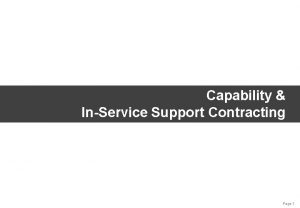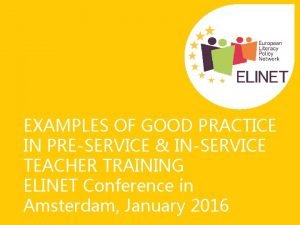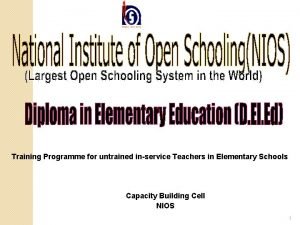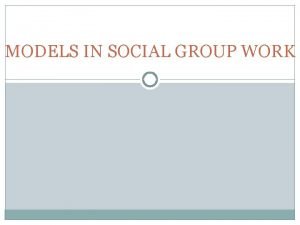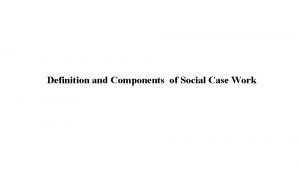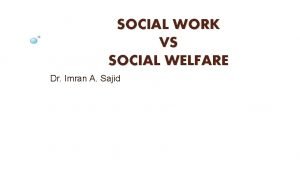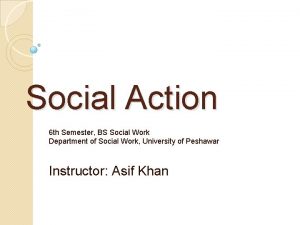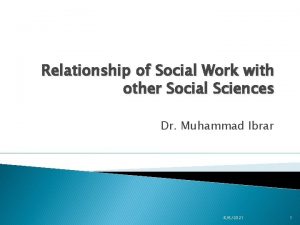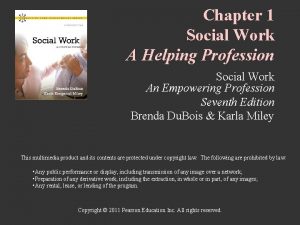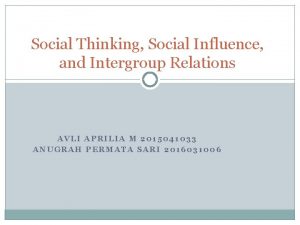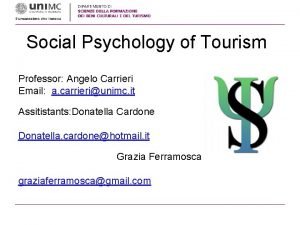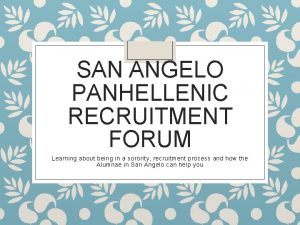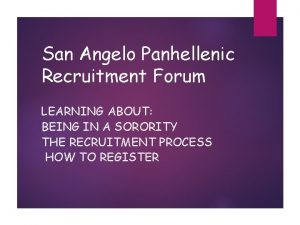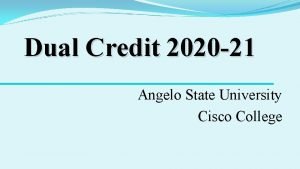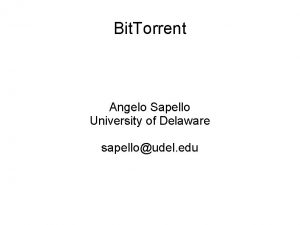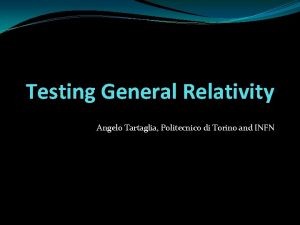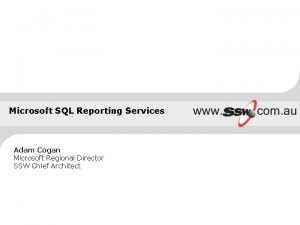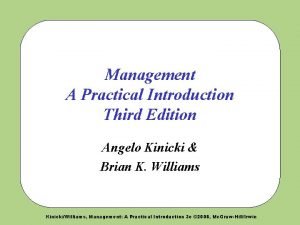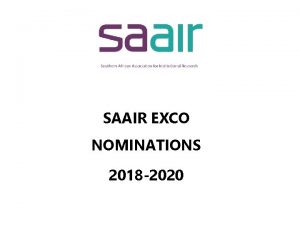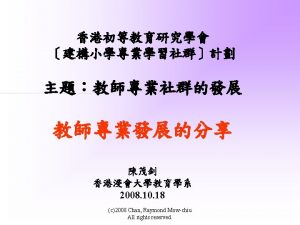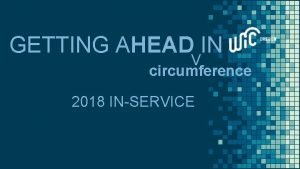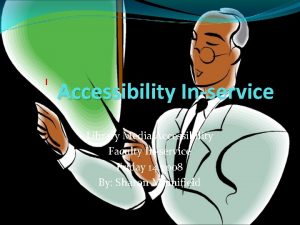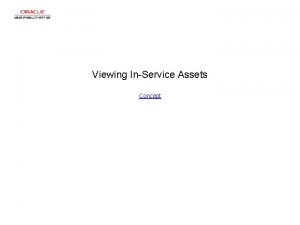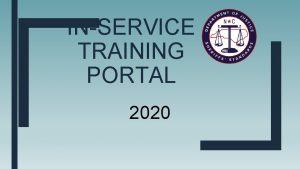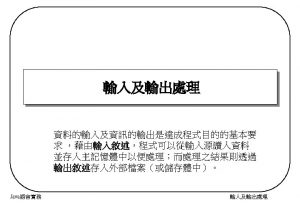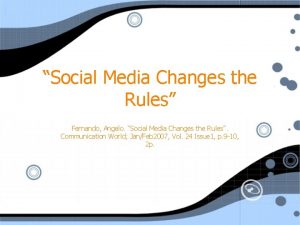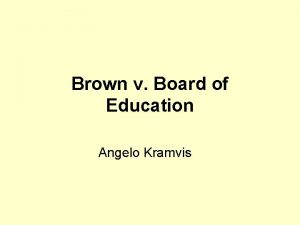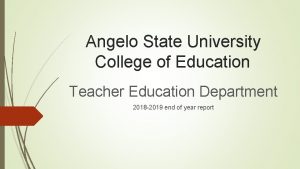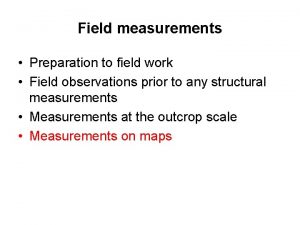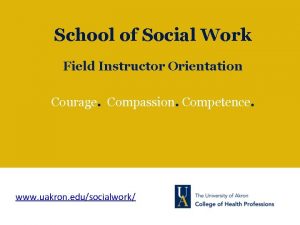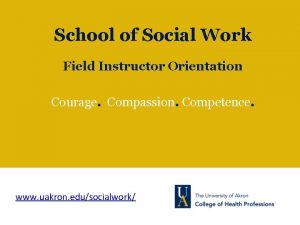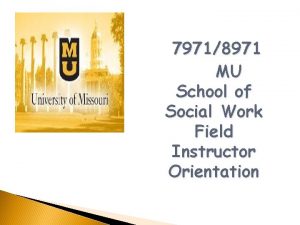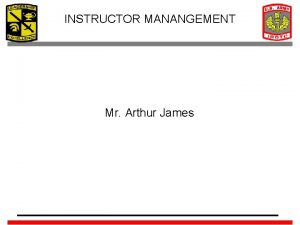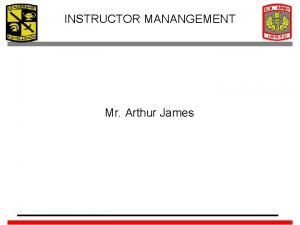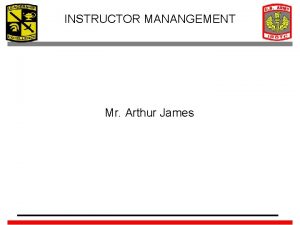SOCIAL WORK FIELD EDUCATION FIELD INSTRUCTOR INSERVICE Angelo



































- Slides: 35

SOCIAL WORK FIELD EDUCATION: FIELD INSTRUCTOR IN-SERVICE Angelo State University Field Education Year 2017 -2018 Anne Scaggs, M. S. W. , LCSW Ingrid Russo, M. S. W. , LCSW Thomas Starkey, Ph. D. , LCSW

OBJECTIVES Participants will be able to understand the role of the Field Education Director, Field Education Liaisons, Field Instructors, and Field Students. What does a successful orientation to your agency look like? Participants will learn the core competencies and behaviors that students need to meet. Participants will be able to understand the process in developing a learning contract with the social work field education students. Participants will be able to understand verbalize the process to resolve ethical dilemmas and how to use supervision. Field Seminar Information that is pertinent to field agency.

INTRODUCTION Department Chair and Associate Professor § Thomas Starkey, Ph. D. , LCSW Field Education Director/Liaison and Clinical Assistant Professor § Ingrid Russo, M. S. W. , LCSW Clinical Assistant Professor and Field Education Liaison § Anne Scaggs, M. S. W. , LCSW

WHY IS FIELD EDUCATION IMPORTANT? Regarded as the capstone of the social work educational experience Focus from acquiring knowledge to applying their knowledge Students are provided with opportunities to apply their knowledge Students will successfully integrate theory into practice, thus learning to service clients effectively Upon completion of the field placement experience the students should be able to begin social work practice within an agency setting.

MISSION OF THE SOCIAL WORK DEPARTMENT As a social work program located in West Central Texas, the mission of the social work program at Angelo State University is to provide quality social work education, based on the knowledge, values and skills of the social work profession; while preparing the students to work with diverse populations with an emphasis on the emerging Hispanic population, the military population, and older adults in both rural and urban settings characteristic of the region. The program will provide professional development opportunities for students who desire to promote the social, psychosocial, or biopsychosocial functioning and well-being of individuals, couples, families, groups, organizations, and communities via generalist social work practice.

FIELD EDUCATION EXPERIENCE § Generalist Practice with diverse individuals, families, groups, organizations, and communities. § Signature Pedagogy—CSWE defines Signature pedagogy as something that represents the central form of instruction and learning in which a profession socializes its students to perform the role of practitioner. As professionals we have norms with which we connect and integrate theory and practice and field is the way that Social Work can do that.

FIELD EDUCATION HOUR EXPECTATIONS ASU BSW social work program requires 500 hours; 250 for Field Education I and 250 for Field Education II. 30 hours are classroom hours; 15 for Field Education I and 15 for Field Education II. Student needs to complete 235 hours in the fall and 235 hours in the spring. Approx: 16 hrs/week

ROLES IN FIELD EDUCATION Field Education Director Instructor/Agency Liaison Student

FIELD EDUCATION DIRECTOR ROLE Develop and maintain placement sites for the social work students to complete their field education component. Update Field education forms yearly. Establish standards for field education program, continuously looking at how we can improve the field education experience. Serve as consultant to students, faculty, and field instructors as needed. Monitor placement for quality of educational experience. Coordinate problematic situations with the BSW Program Director. Removal of students of requested by field instructor.

FIELD EDUCATION LIAISON ROLE In conjunction with the Field Director, the Liaison: Serve as resource for student and field instructor. Monitor student activities and growth. Support agency staff in their development as field instructors. Telephone or office visits for all non social work field instructors needing extra support and information. Field Education Liaison: Will conduct two site visits per semester – midterm and final evaluation visits. Coordinate field placement activities.

FIELD EDUCATION LIAISON ROLE, CONT Deal with difficult or atypical situations, usually the Field Liaison will become aware of a situation and will contact the Field Director immediately. Conduct weekly field seminar. Oversee associated assignments related to field seminar. First point of contact for issues, concerns, successes and accomplishments.

FIELD EDUCATION INSTRUCTOR ROLE Be familiar with the core competencies and practice behaviors. Be able to guide students in navigating the following § NASW code of ethics § Texas State Board of Social work examiners (TSBSWE) Code of Conduct § TSBSWE scope of practice http: //www. socialworkers. org/pubs/code. asp http: //www. dshs. state. tx. us/socialwork/sw_forms. shtm Create atmosphere/opportunity for learning. Assure quality of service for clients. Be familiar with the field education manual.

FIELD EDUCATION INSTRUCTOR ROLE, CONT Educators in the field and play an important role in the professional development of the student. Assist student in identifying learning objectives and opportunities (fall and spring). Provide weekly, one hour supervisory sessions (oneone); can be split. Provide mentoring, role modeling, and teaching of practice applications. Provide feedback and evaluation. Sign weekly Time sheet for student—Field Instructor only. Midterm/Final Evaluations completed every semester.

FIELD INSTRUCTOR CHALLENGES Teaching students how to practice social work (advocating, casework, challenging injustices, etc. ), not how to do a particular job at your agency. Orientation to the agency—student’s first few days will set the tone for the rest of the year. Formal orientation, policies and procedures, etc. Student doesn’t seem motivated, not building rapport with clients, etc.

SUGGESTED ORIENTATION TOOL FOR FIELD INSTRUCTORS

SUGGESTED TOOL FOR SUPERVISION

FIELD EDUCATION SOCIAL WORK STUDENT ROLE Responsibilities at the Agency: Interview; background check; research agency/clients. Fill out interview response form. Register for Malpractice Insurance (ie NASW Assurance). Provide field instructor with hours that they will be available to be at the agency. Be aware of agency policy and procedures. Be aware of expectations of field agency, field instructor, and university. Participate in supervisory sessions— 1 hour per week.

FIELD EDUCATION SOCIAL WORK STUDENT ROLE, CONT Take an active role, in pursuing educational needs—need to be proactive. Identify learning objectives—will write up learning plan goals and will seek clarification from field instructor on their learning plan. Ask questions and write down information because you may need it at a later time. Participate in personal evaluations and client evaluations.

FIELD EDUCATION SOCIAL WORK STUDENT ROLES, CONT Field Seminar Responsibilities: Attend weekly seminar course and complete weekly summary or process recording. Hand in weekly time sheet signed by Field Instructor. Participate in completion of field education tasks at the agency and in field seminar. Adhere to the NASW Code of Ethics. Adhere to the Texas State Board of Social Work Examiners Code of Conduct. Adhere to Texas State Board of Social Work Examiners Scope of Practice. Have a copy of these documents with you at all times and discuss during supervision with your students. Complete Midterm/Final Evaluation and go over with field instructor and Liaison.

PROCEDURES FOR CHANGE OF PLACEMENT If problems arise in the placement after there has been communication between the field instructor and student regarding the problem: Contact Field Liaison. Instructor/Student, Field Liaison, Field Director meet to discuss solutions. Consultation with Stakeholders. Field Director makes accommodations for decision. **Each step requires written documentation from all parties** **Any change in placement requires completion of necessary forms** http: //www. angelo. edu/content/files/20832 -angelo-stateuniversity-bsw-field-education

FIELD EDUCATION COMPETENCIES AND PRACTICE BEHAVIORS CSWE has 9 Core Competencies that are part of the EPAS 2015. § 31 specific behaviors. § Each Core Competency has at least two associated behaviors. § Each behavior will be measured during a student’s field education experience.

FIELD EDUCATION COMPETENCIES Competency 1: Demonstrate Ethical and Professional Behavior: make ethical decisions by applying the standards of the NASW Code of Ethics, relevant laws and regulations, models for ethical decision-making, ethical conduct of research, and additional codes of ethics as appropriate to context; use reflection and self-regulation to manage personal values and maintain professionalism in practice situations; demonstrate professional demeanor in behavior; appearance; and oral, written, and electronic communication; use technology ethically and appropriately to facilitate practice outcomes; and use supervision and consultation to guide professional judgment and behavior

FIELD EDUCATION COMPETENCIES, CONT Competency 2: Engage Diversity and Difference in Practice apply and communicate understanding of the importance of diversity and difference in shaping life experiences in practice at the micro, mezzo, and macro levels; present themselves as learners and engage clients and constituencies as experts of their own experiences; and apply self-awareness and self-regulation to manage the influence of personal biases and values in working with diverse clients and constituencies.

FIELD EDUCATION COMPETENCIES, CONT Competency 3: Advance Human Rights and Social, Economic, and Environmental Justice apply their understanding of social, economic, and environmental justice to advocate for human rights at the individual and system levels; and engage in practices that advance social, economic, and environmental justice.

FIELD EDUCATION COMPETENCIES, CONT Competency 4: Engage In Practice-informed Research and Research-informed Practice use practice experience and theory to inform scientific inquiry and research; apply critical thinking to engage in analysis of quantitative and qualitative research methods and research findings; and use and translate research evidence to inform and improve practice, policy, and service delivery

FIELD EDUCATION COMPETENCIES, CONT Competency 5: Engage in Policy Practice Identify social policy at the local, state, and federal level that impacts well-being, service delivery, and access to social services; assess how social welfare and economic policies impact the delivery of and access to social services; apply critical thinking to analyze, formulate, and advocate for policies that advance human rights and social, economic, and environmental justice.

FIELD EDUCATION COMPETENCIES, CONT Competency 6: Engage with Individuals, Families, Groups, Organizations, and Communities apply knowledge of human behavior and the social environment, person-in-environment, and other multidisciplinary theoretical frameworks to engage with clients and constituencies; and use empathy, reflection, and interpersonal skills to effectively engage diverse clients and constituencies.

FIELD EDUCATION COMPETENCIES, CONT Competency 7: Assess Individuals, Families, Groups, Organizations, and Communities collect and organize data, and apply critical thinking to interpret information from clients and constituencies; apply knowledge of human behavior and the social environment, person-in-environment, and other multidisciplinary theoretical frameworks in the analysis of assessment data from clients and constituencies; develop mutually agreed-on intervention goals and objectives based on the critical assessment of strengths, needs, and challenges within clients and constituencies; and select appropriate intervention strategies based on the assessment, research knowledge, and values and preferences of clients and constituencies.

FIELD EDUCATION COMPETENCIES, CONT Competency 8: Intervene with Individuals, Families, Groups, Organizations, and Communities critically choose and implement interventions to achieve practice goals and enhance capacities of clients and constituencies; apply knowledge of human behavior and the social environment, person-in-environment, and other multidisciplinary theoretical frameworks in interventions with clients and constituencies; use inter-professional collaboration as appropriate to achieve beneficial practice outcomes; negotiate, mediate, and advocate with and on behalf of diverse clients and constituencies; and facilitate effective transitions and endings that advance mutually agreed-on goals.

FIELD EDUCATION COMPETENCIES, CONT Competency 9: Evaluate Practice with Individuals, Families, Groups, Organizations, and Communities select and use appropriate methods for evaluation of outcomes; apply knowledge of human behavior and the social environment, person-in-environment, and other multidisciplinary theoretical frameworks in the evaluation of outcomes; critically analyze, monitor, and evaluate intervention and program processes and outcomes; and apply evaluation findings to improve practice effectiveness at the micro, mezzo, and macro levels.

ETHICAL PROBLEMS/SUPERVISION Dual Relationships § Supervisor vs. Teacher (Employer/Field Instructor) § Students being placed at place of employment, not allowed due to not wanting student to be treated as an employee. Students are not employees. § Often do the work of an employee, but field instructor needs to make the distinction known. § Make sure that students do social work activities, not just busy work. § Students are not personal valet, getting coffee, dry cleaning, etc.

ETHICAL PROBLEMS/SUPERVISION, CONT What happens if a student makes a mistake? § Education. § Supervision. Confidentiality: Does the student understand what their role is concerning confidentiality? § Clear parameters with Field Education Instructor/Agency, NASW, and University. § Reporting to Field Education Director and/or Liaison if having difficulty with field instructor and/or a client. § Discussing among other students, not allowed, unless in class with a field liaison it is allowed without giving any identifying info.

INAPPROPRIATE TASKS Asking student to drive clients in own car Having a student take a client to an appointment without supervision from field instructor or other agency staff Having a student working a shift or completing field hours without supervision from field instructor or other agency staff Cleaning out closets, cars, babysitting, etc. Having students pay for client’s food, medicine, etc. out of own pocket Having student supervise agency staff Having students dress a certain way to attract donors to your agency

FIELD SEMINAR Discuss this with your student. What are the: 1. Tasks and Responsibilities in field seminar 2. Discussion Topics 3. Process recording/Summary 4. Confidentiality

QUESTIONS? Ingrid Russo, M. S. W. , LCSW 325 -486 -6126 Ingrid. Russo@angelo. edu Anne Scaggs, M. S. W. , LCSW 325 -486 -6135 Anne. Scaggs@angelo. edu
 Inservice
Inservice Inservice examples
Inservice examples Inservice training assignment
Inservice training assignment Models of group work practice
Models of group work practice Case work definition
Case work definition Social work education in pakistan
Social work education in pakistan Social welfare vs social work
Social welfare vs social work Principle of dramatization
Principle of dramatization Relationship of social work with other social sciences
Relationship of social work with other social sciences Global agenda for social work and social development
Global agenda for social work and social development Social change in social work
Social change in social work Apa itu social thinking
Apa itu social thinking Social thinking social influence social relations
Social thinking social influence social relations Social psychology
Social psychology San angelo panhellenic
San angelo panhellenic Dr amilcare
Dr amilcare Dr paparello northwestern
Dr paparello northwestern Rebecca torrijas
Rebecca torrijas Angelo buono childhood
Angelo buono childhood Angelo gadina
Angelo gadina Angelo corallo
Angelo corallo Angelo mario venditti
Angelo mario venditti Adam d'angelo
Adam d'angelo San angelo panhellenic
San angelo panhellenic Angelo state university tuition per semester
Angelo state university tuition per semester Sally d'angelo torrent
Sally d'angelo torrent Angelo farina
Angelo farina Tartaglia triangolo
Tartaglia triangolo Angelo tartaglia politecnico torino
Angelo tartaglia politecnico torino If maribel a groupmate of angelo in number 2
If maribel a groupmate of angelo in number 2 Angelo voulgaris
Angelo voulgaris Angelo kinicki management: a practical introduction
Angelo kinicki management: a practical introduction Diaket
Diaket Dr angelo fynn
Dr angelo fynn Tema del varco montale
Tema del varco montale Dr maya angelo
Dr maya angelo
